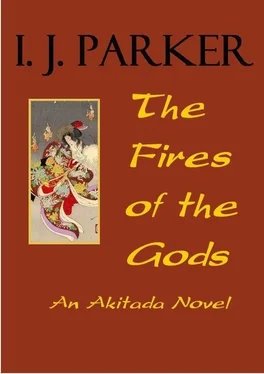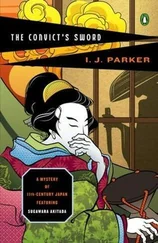I Parker - The Masuda Affair
Здесь есть возможность читать онлайн «I Parker - The Masuda Affair» весь текст электронной книги совершенно бесплатно (целиком полную версию без сокращений). В некоторых случаях можно слушать аудио, скачать через торрент в формате fb2 и присутствует краткое содержание. Жанр: Исторический детектив, на английском языке. Описание произведения, (предисловие) а так же отзывы посетителей доступны на портале библиотеки ЛибКат.
- Название:The Masuda Affair
- Автор:
- Жанр:
- Год:неизвестен
- ISBN:нет данных
- Рейтинг книги:3 / 5. Голосов: 1
-
Избранное:Добавить в избранное
- Отзывы:
-
Ваша оценка:
- 60
- 1
- 2
- 3
- 4
- 5
The Masuda Affair: краткое содержание, описание и аннотация
Предлагаем к чтению аннотацию, описание, краткое содержание или предисловие (зависит от того, что написал сам автор книги «The Masuda Affair»). Если вы не нашли необходимую информацию о книге — напишите в комментариях, мы постараемся отыскать её.
The Masuda Affair — читать онлайн бесплатно полную книгу (весь текст) целиком
Ниже представлен текст книги, разбитый по страницам. Система сохранения места последней прочитанной страницы, позволяет с удобством читать онлайн бесплатно книгу «The Masuda Affair», без необходимости каждый раз заново искать на чём Вы остановились. Поставьте закладку, и сможете в любой момент перейти на страницу, на которой закончили чтение.
Интервал:
Закладка:
The Masuda Affair
I. J. Parker
CHARACTERS
(Japanese family names precede first names)
MAIN CHARACTERS:
Sugawara Akitada senior secretary in the Ministry of Justice
Tamako his wife
Seimei an aged family retainer of the Sugawaras
Tora another retainer – young and of a romantic disposition
Genba a third retainer, middle-aged and with a love for food
Kobe superintendent of police
CHARACTERS INVOLVED IN THE CASES IN OTSU:
Lord Masuda an old and wealthy nobleman
Masuda Tadayori his dead son
Lady Masuda his daughter-in-law; first lady of his late son
Lady Kohime his other daughter-in-law; second lady of his late son two little girls
Kohime’s daughters
Mrs Ishikawa their nurse
Ishikawa her son, steward to Lord Sadanori
Peony late courtesan kept by Masuda Tadayori
Little Abbess her maid
Mrs Yozaemon a poor widow in Otsu
Manjiro her teenage son
Nakano a judge
Takechi a warden the Mimuras a fisherman and his wife the deaf-mute boy Dr Inabe (also, a cat) the Mimuras’ alleged son a physician
CHARACTERS INVOLVED IN THE CASE IN THE CAPITAL:
Fujiwara Sadanori a powerful nobleman and relative of the chancellor
Lady Saisho his mother
Seijiro her servant
Hanae a pretty dancer from the amusement quarter
Ohiya her dancing master
Mrs Hamada her nosy neighbor an elusive monk and assorted prostitutes (also, a shaggy dog)
ONE
He was on his homeward journey when he found the boy. At the time, caught in the depth of hopelessness and grief, he did not understand the significance of their meeting.
Sugawara Akitada, a member of the privileged class and moderately successful in the service of the emperor, was barely in the middle of his life and already sick of it. He used to counter hardship, humiliation, and even imminent death, with courage, and he had drawn fresh zest for new obstacles from his achievements, but when his young son had died during that spring’s smallpox epidemic, he found no solace. He went through the motions of daily life as if he were no part of them, as if the man he once was had departed with the smoke from his son’s funeral pyre, leaving behind an empty shell inhabited by a stranger.
The poets called it the ‘darkness of the heart’, this inconsolable grief a parent feels after the death of a child, a despair of life that clouds the mind and makes a torment of day-to-day existence.
Having completed an assignment in Hikone two days earlier, Akitada rode along the southern shore of Lake Biwa in a steady drizzle. The air was saturated with moisture, his clothes clung uncomfortably, and both rider and horse were sore from the wooden saddle. This was the fifteenth day of the watery month, in the rainy season. The road had long since become a muddy track where puddles hid deep pits in which a horse could break its leg. It became clear that he could not reach his home in the capital, but would have to spend the night in Otsu.
In Otsu, wives or parents would bid farewell, perhaps forever, to their husbands or sons when they left the capital to begin their service in distant provinces. Akitada himself had felt the uncertainty of life on such occasions. But those days seemed in a distant past now. He cared little what lay ahead, and his wife cared little about him.
Near dusk he passed through a dense forest. Darkness closed in, falling with the misting rain from the branches above and creeping from the dank shadows of the woods. When he could no longer see the road clearly, he dismounted. Leading his tired horse, he trudged onward in squelching boots and sodden straw rain cape and thought of death.
He was still in the forest when a child’s whimpering roused him from his grief. He stopped and called out, but there was no answer, and all was still again except for the dripping rain. He was almost certain the sound had been human, but the eeriness of a child’s pitiful weeping in this lonely, dark place on his lonely, dark journey seemed too cruel a coincidence. This was the first night of the three day O-bon festival, the night when the spirits of the dead return to their homes for a visit before departing for another year.
If his own son’s soul was seeking its way home, Yori would not find his father there. Would he cry for him from the darkness? Akitada shivered and shook off his sick fancies. Such superstitions were for simpler, more trusting minds. How far was Otsu?
Then he heard it again.
‘Who is that? Come out where I can see you!’ he bellowed angrily into the darkness. His horse twitched its ears and shook its head.
Something pale detached itself from one of the tree trunks and crept closer. A small boy. He caught his breath and called out, ‘Yori?’
Foolishness! This was no ghost. It was a ragged child with huge frightened eyes in a pale face, a boy nothing at all like Yori. Yori had been handsome, well-nourished, and sturdy. This boy in his filthy, torn shirt had sticks for arms and legs. He looked permanently hungry, a living ghost.
‘Are you lost, child?’ asked Akitada, more gently, wishing he had food in his saddlebags. The boy remained silent and kept his distance.
‘What is your name?’
No answer.
‘Where do you live?’
Silence.
The child probably knew his way around these woods better than Akitada. With a farewell wave, Akitada resumed his journey. The rain stopped, and soon the trees thinned and the darkness receded slightly. Grey dusk filtered through the branches, and ahead lay a paler sliver which was the lake and – thank heaven – the many small golden points of light, like a gathering of fireflies, that were the dwellings of Otsu. He glanced back at the dark forest, and there, not ten feet behind, waited the child.
‘Do you want to come with me then?’ Akitada asked.
The boy said nothing, but he edged closer until he stood beside the horse. Akitada saw that his ragged shirt was soaked and clung to the ribs of his small chest.
A deaf-mute? Oh well, perhaps someone in Otsu would know the boy.
Bending down, Akitada lifted him into the saddle. He weighed so little, poor sprite, that he would hardly trouble the horse. He took the bridle again and trudged on. For the rest of their journey, Akitada looked back from time to time to make sure the boy had not fallen off. Now and then he asked him a question or made a comment, but the child did not respond in any way. He sat quietly, almost expectantly, in the saddle as they approached Otsu.
Ahead beckoned bonfires, quickly assembled after the rain to welcome the spirits of the dead. Most people believed that spirits got lost, like this child, and also that they felt hunger. In Otsu’s cemetery tiny lights blinked, marking a trail to town, and in the doorway of every home offerings of food and water awaited the returning souls, those hungry ghosts depicted in temple paintings, skeletal creatures with distended bellies, condemned to eat excrement or suffer unending hunger and thirst as punishment for their wasteful lives.
In the market, people were shopping for the three-day festival. The doors of houses stood wide open, and inside Akitada could see spirit altars erected before the family shrines, heaped with more fine things to eat and drink. So much good food wasted on ghosts!
They passed a rice-cake vendor with trays of fragrant white cakes. Yori had loved rice cakes filled with sweet bean jam. Akitada dug two coppers from his sash and bought one for the boy. The child received it with solemn dignity and bowed his thanks before gobbling it down. As miserable and hungry as this urchin was, he had not forgotten his manners. Akitada was intrigued and decided to do his best for the child.
Читать дальшеИнтервал:
Закладка:
Похожие книги на «The Masuda Affair»
Представляем Вашему вниманию похожие книги на «The Masuda Affair» списком для выбора. Мы отобрали схожую по названию и смыслу литературу в надежде предоставить читателям больше вариантов отыскать новые, интересные, ещё непрочитанные произведения.
Обсуждение, отзывы о книге «The Masuda Affair» и просто собственные мнения читателей. Оставьте ваши комментарии, напишите, что Вы думаете о произведении, его смысле или главных героях. Укажите что конкретно понравилось, а что нет, и почему Вы так считаете.












